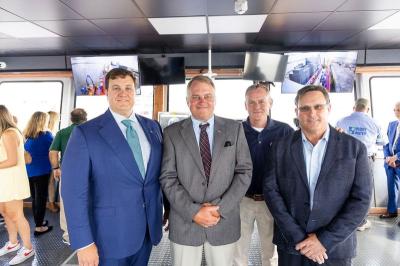RICHMOND, VA (AP) Virginia business leaders are growing increasingly frustrated with politicians’ failure to address an eroding transportation network that saps productivity, increases costs and makes it harder to recruit workers.
Long delays on northern Virginia’s major highways threaten the engine of the state’s economy, business and transportation officials said. And Hampton Roads isn’t so far behind. Problems with Interstate 64 construction and the failure to build more James River crossings have bogged down the region. Even southwest Virginia suffers, with commuters and truckers fighting for space on Interstate 81.
“I suspect that there is some party gamesmanship going on,” said Michael Petters, president of Northrop Grumman’s Newport News shipyard. “I guess I don’t have a lot of patience for that. I’m really at a point where we need to see results.”
From 1986 to 2003, the number of vehicle miles traveled on Virginia roads rose 80 percent while new lane miles increased in the single digits. Housing shortages have accelerated congestion by pushing residents farther away from their jobs. And a healthy economy and higher defense spending have further strained the highway grid, particularly in the state’s northern and eastern sections.
Despite the extra pressure, there has been no substantial increase in Virginia Department of Transportation’s (VDOT) budget since the 1980s. Since 2001, the state has cut its six-year road-building program by more than one-third, forcing the agency to shift almost all its efforts to maintaining existing roads and facilities while putting off plans for new construction.
As the last legislative session closed, Del. Richard L. Black, R-Loudoun, told The Associated Press that legislators had informed residents that transportation was a priority, but that the new budget contained no significant funding for roads and transit.
“The public can take a cynical view and ask, ’Can we really believe these guys ever?’ I think it’s a betrayal of the people of the state of Virginia,” he said.
In the upcoming session, Black said he was optimistic about transportation funding because of the pressures lawmakers are feeling. He said he would introduce a bill to protect money designated for transportation.
Gov. Mark R. Warner already has proposed spending $824 million to pay off debts on road projects, fund road-building ventures with private partners and help rail and urban transit.
But state officials caution that the money — mostly from an expected surplus —will make only a dent in Virginia’s transportation needs. And with all House of Delegates seats and the state’s three top elected positions up for grabs next year, the conventional wisdom is that the state will avoid new taxes.
That attitude bothers some corporate leaders, who say choked roadways delay deliveries, increase fuel expenses, and create barriers to recruitment and retention. In the Washington area alone, congestion-related delays led to an estimated $2.3 billion in wasted time and fuel in 2002, according to the Texas Transportation Institute.
“I think the thing that frustrates me right now is that we are still hung up on debating the process for doing this,” Petters said. “I don’t understand all the mechanics the General Assembly has to go though to get this done. Whatever they need to do, they need to get through with it.”
Any business that delivers goods knows how costly traffic can be.
David Guernsey, chief executive of Guernsey Office Products in Chantilly, said he spent millions of dollars to open another docking facility in Beltsville, MD — simply so his trucks could avoid snarls crossing the Potomac River. He also tackled the congestion problem by buying more trucks and starting a “dawn patrol,” sending trucks on the road at 3 a.m. to serve customers taking early deliveries.
Still, he said, his drivers struggle.
“What I do know is drivers are becoming more and more familiar with neighborhood streets,” he said. “I don’t know that that’s a good idea … but that’s the reality. That’s what these guys have to do.”
Congestion also can slow tourism, said Colin Campbell, president of the Colonial Williamsburg non-profit foundation and a proponent of high-speed rail linking Washington, Richmond and the Newport News/Williamsburg area.
“The 95 corridor is extremely crowded,” Campbell said. “That is a deterrent for people to make the effort to come here.”
The state’s transportation problems are particularly worrisome with the approach of the 400th anniversary of the founding of Jamestown, which promises to bring large crowds of tourists to Virginia in 2007, Campbell said.
With no significant funding in sight, Philip Shucet, commissioner of the Virginia Department of Transportation, painted a grim picture of the state’s highways in the near future. If current levels of funding continue, the agency will have diverted $1.9 billion from construction to maintenance by 2010.
“I guess what bothers me is the fact that the taxpayers are now paying this added cost that’s only going to grow if we can’t solve our transportation problem,” Shucet said. “From an economic point of view … that’s not a business model I think we need for Virginia.”
By far, northern Virginia has the worst traffic problems in the state, with the annual delay per rush-hour traveler in the Washington area totaling about seven work days in traffic in 2002 — triple the amount in 1982, according to the transportation institute.
Hampton Roads is second, with travelers spending 28 hours in rush-hour delays in 2002, more than double the amount in 1982.
A consultant recently told the Hampton Roads Economic Development Alliance that increasing congestion on the region’s roads and bridges is “hampering the ability of businesses to provide just-in-time shipment of goods and finished products.”
Shucet also warned that, with few crossings over the James River, the region risks splitting into a Peninsula economy that looks to Richmond and a South Hampton Roads economy “that has nowhere to go.”
While some business leaders note that voters in Hampton Roads and northern Virginia refused to approve transportation referendums in 2002, others said the denials in part reflected a lack of confidence in legislators who used money in the state transportation fund for general fund use. And though Shucet has since been praised for making improvements to the transportation department’s operations, the agency had a poor track record of completing projects.
“They have to spend money on good projects that are finished on time and under budget and will address the transportation needs,” said Bob Grow, government relations director for the Greater Washington Board of Trade.
Business leaders said they need similar assurances, along with a guarantee that there will be some continuity in the state’s transportation leadership.
“My problem is that Shucet has done a heck of a job and [Transportation Secretary] Whittington Clement has done a heck of a job,” said Don Hall, president of the Virginia Automobile Dealers Association. “But what happens one year from today?”
For more information, visit www.virginiadot.org or mobility.tamu.edu/ums.
Today's top stories















